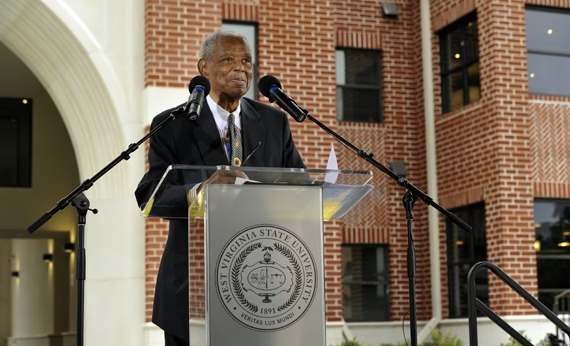Contact: Jack Bailey (304) 766-4109 Jbaile19@wvstateu.edu
INSTITUTE, W.Va. – U.S. District Court Judge and West Virginia State University (WVSU) alumnus Damon J. Keith passed away Sunday, April 28, in Detroit, Michigan.
“Judge Keith, for whom our scholars residence hall is named, was one of the nation’s longest-serving federal judges, and was a legendary champion of civil rights and civil liberties during his tenure on the bench,” said WVSU President Anthony L. Jenkins. “We all should be honored to have known Judge Keith, and to have him associated with our beloved University. Judge Keith lived an incredible life. One that inspired men and women across West Virginia, Michigan and throughout our nation. His life and legacy embodied the true essence of a West Virginia State University graduate.”
Keith graduated from what was then West Virginia State College in 1943 and would go on to graduate from the Howard University Law School in 1949 and the Wayne State University Law School in 1956. He had served as a judge on the United States Court of Appeals for the Sixth Circuit since 1967. Prior to his appointment to the Court of Appeals, Keith served as Chief Judge of the United States District Court for the Eastern District of Michigan.
In 2013, WVSU broke ground on a new residence hall on campus to be named in honor of Keith, the Judge Damon J. Keith Scholars Hall.
“West Virginia State College shaped my entire future,” Keith said at the time. “I had gone to school in Detroit from kindergarten through high school and I had never had a black teacher. When I came here to West Virginia State College, it was all black at that time. We had black Ph.D.’s on the faculty. It looked as though the cataracts in my eyes were taken off because of my experience here. I felt motivated. Seeing these great black leaders come and inspire us as young black students.”
As a member of the federal judiciary, Keith stood as a courageous defender of the constitutional and civil rights of all people. In United States v. Sinclair, commonly referred to as “the Keith Decision,” the Supreme Court unanimously affirmed Judge Keith’s landmark ruling prohibiting President Richard Nixon and the federal government from engaging in warrantless wiretapping in violation of the Fourth Amendment.
More recently, in Detroit Free Press v. Ashcroft, Keith stood up to President George W. Bush during the aftermath of 9/11. Writing for a unanimous United States Court of Appeals panel, Judge Keith declared “Democracies die behind closed doors,” and ruled it unlawful for the Bush administration to conduct deportation hearings in secret whenever the government asserted that the people involved might be linked to terrorism.
Keith was the recipient of numerous awards, including the NAACP’s highest award, the Spingarn Medal. Other prominent honors included the American Bar Association’s Thurgood Marshall Award, the Distinguished Public Service Award from the National Anti-Defamation League and the Detroit Urban League’s Distinguished Warrior Award.
In 2005, Harvard University’s Department of Afro-American Studies included Keith in its African-American National Biography, a collection of biographies profiling eminent African-Americans. The Detroit Board of Education has dedicated one of its primary schools in his honor, naming it “The Damon J. Keith Elementary School.”
Keith received more than 40 honorary degrees from colleges and universities across the country. In 2010, Keith was inducted into the International Civil Rights Walk of Fame in Atlanta. In 2011, the Damon J. Keith Center for Civil Rights at Wayne State University Law School opened its doors.
A biography of Keith, written by columnist Trevor W. Coleman, titled “Crusader for Justice: The Life and Amazing Times of Federal Judge Damon J. Keith,” was published in 2014.
Keith was married for 53 years to the late Dr. Rachel Boone Keith. They had three daughters, Gilda Keith, Debbie Keith and Cecile Keith-Brown.
Follow on Facebook, Instagram and Twitter .
